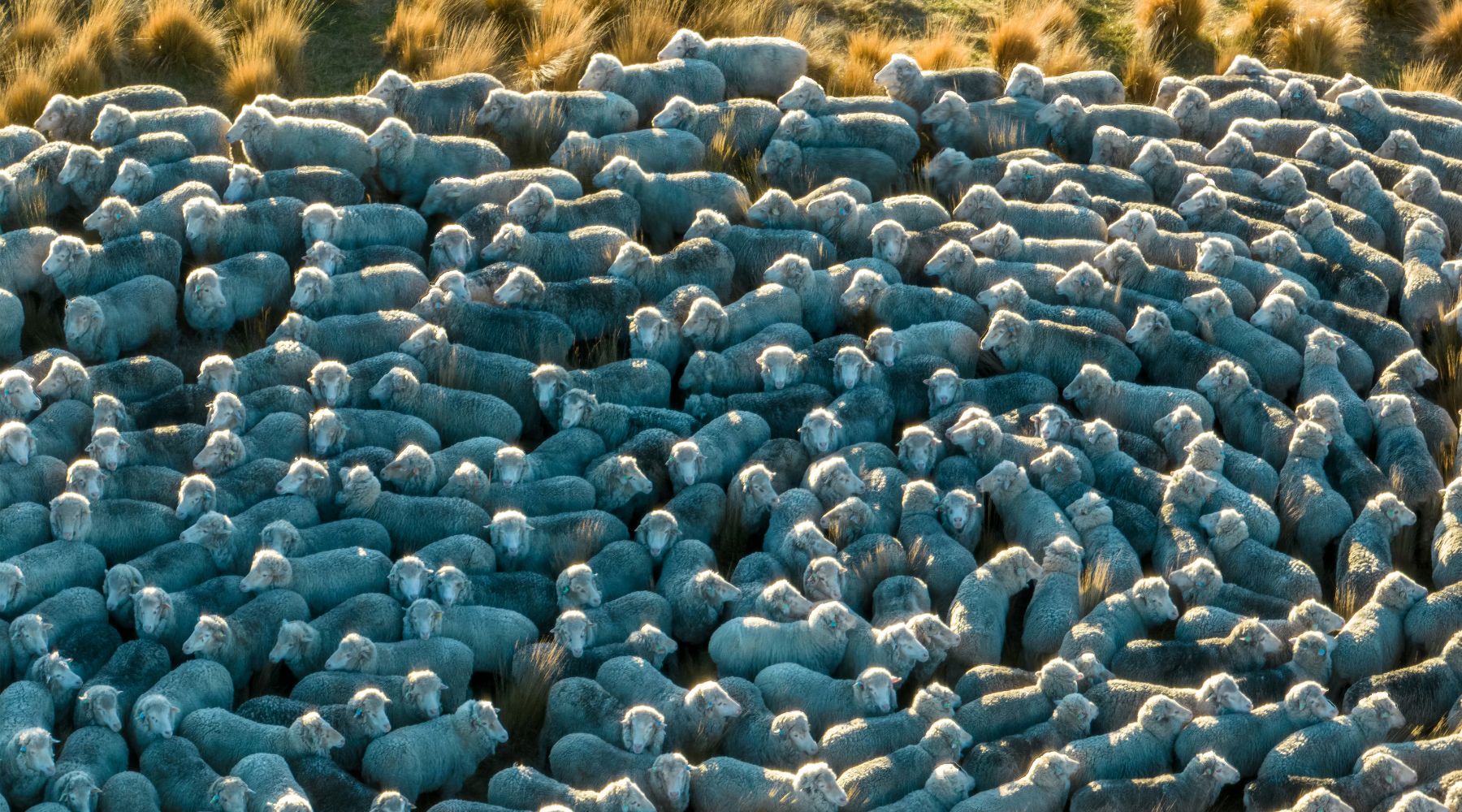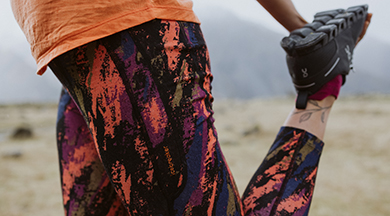Merino wool benefits
29 November 2024
You’ve heard of merino wool. Maybe you own a merino jumper, or some socks, and you love how beautifully soft it feels against your skin. But have you thought about where merino wool comes from, and what exactly makes it so special?
Our responsibly-sourced merino wool comes from the fine fleece of high-welfare merino sheep that live in the wild landscape of New Zealand. Its natural thermo-regulation properties help keep you warm when it’s cold, and fresh and dry in hot temperatures. And there are many more merino wool benefits that make it the ideal fabric for high-performance activewear, whether you love skiing at high altitude or hitting the trail at dawn.
Merino wool is a completely natural fibre with many benefits, from a luxurious texture to adaptability to different climates and temperatures. Its incredibly fine fibres give merino wool a unique softness that makes it feel amazing next to your skin. Its unique fibre structure also makes it naturally breathable and gives it excellent temperature regulation abilities.

Softness and comfort
One of the best-known benefits of merino wool is its natural softness and comfort. Just putting on merino wool clothing feels luxurious – indulgent, even. It’s all down to merino wool’s fine fibres, which make it glide over the skin.
People who complain that lambswool or mohair causes itching don’t tend to have the same problem with merino wool. Why is merino wool so good for the skin? Because it’s so smooth, merino wool is the perfect fabric for garments worn close to the body, whether you tend to find regular wool too itchy or not. Being wrapped in merino wool just feels good. In fact, merino wool is so soft and comfortable, you might find it hard to believe it’s actually wool you’re wearing next to your skin.

Temperature regulation
Clothing made from merino wool benefits adventure-lovers who enjoy activities that expose them to a range of different temperatures, because of its amazing natural thermo-regulation properties.
Why is merino wool good in fluctuating temperatures? Imagine hitting the trailhead at dawn when it’s cold, then hiking through until the middle of the day, when the sun’s at its hottest. Believe it or not, merino wool will keep you warm and toasty in the cold of the morning, and fresh and cool as the day gets hotter.
That’s because its unique fibre structure traps air, creating a natural insulating layer that keeps you warm when it’s cold outside. And its natural breathability (those fibres again) lets heat escape – so it keeps you cool when the temperature rises. So while you might never have considered wearing merino wool in summer, a merino t-shirt or base layer actually makes the ideal bit of kit for your warm-weather outdoor adventures.
Odour resistance
The structure of merino wool fibres is one of the reasons why merino wool is so good at resisting odours. And that’s why you can wear it for longer between washes (better for the planet, better for your bills). The secret is in the natural crimp of the fibres (which also helps give merino wool its luxurious feel). And merino wool contains lanolin, which has antibacterial properties.
So whether you’re cycling with friends, scaling your toughest peak yet or exploring new trails, you’ve got the confidence that comes from knowing you smell as good as your merino wool clothing makes you look and feel. Which means you can stay completely in the moment.

Sustainability
At icebreaker, sustainability is what keeps us up at night and gets us up in the morning.
We strive to make sure that the way we source our merino wool benefits the sheep, our partners, the planet and our customers, and our goal is to become completely plastic free. We boldly acknowledge our 2023 100% plastic free goal was not achieved; we proudly celebrate our failure of only reaching 96.14% plastic-free.
Merino wool is an annually renewable resource, as the fleece of merino sheep regrow naturally each year. So if you want to make more responsible choices when it comes to your activewear without compromising on performance, merino wool can be a great place to start.
Ease of care
It’s easier than you might think to care for merino wool and keep it looking and feeling really good. First up – its natural ability to resist odours and bacteria means you don’t need to wash it as often.
Yep – even after a long hike where you’ve worked up a sweat, if you’ve just worn it once, there’s probably no need to wash your merino wool t-shirt or base layer (unless it’s actually dirty). Of course, fewer washes mean a longer life for your merino clothing.
When it does need cleaning, washing merino wool is straightforward, as you can machine wash many merino garments (as long as you use a cool or cold wash). The most important thing is to check the care label and follow the specific washing instructions for your garment.
Versatility
Merino wool is a lot more versatile than you might think – cosy winter jumpers are just the start. But is merino wool good for summer clothing too? Yes – in fact, merino wool is perfect for every season. In summer, its natural breathability and moisture-wicking properties let heat escape and keep you cool – so whatever the time of year, merino wool is almost always an ideal choice when you’re heading outdoors.
Merino wool fibres have natural stretch and elasticity. So it’s perfect for more active adventures that involve stretching and extending your body. Because of all of these qualities, merino wool is used to make all types of clothing: high-performance, lightweight base layers, warm sweaters, leggings and summer t-shirts. It’s also a brilliant choice for accessories like hats, scarves and socks.

Comparison with other materials
How does merino wool fabric stack up against other materials? Cotton and synthetics are popular choices for activewear, but they don’t have all the brilliant merino wool benefits you’re probably familiar with by now.
While cotton is breathable and soft, it doesn’t have the same insulation capabilities as merino wool, and it dries much less quickly. And as anyone who’s ever had to put on a damp cotton t-shirt knows, wet cotton makes you feel chilly fast. And while synthetic fabrics can trap moisture and odours, making them damp and smelly, merino wool naturally wicks sweat away from the skin.
Merino wool is also a winner when it comes to sustainability. It’s annually renewable, as sheep regrow their fleeces every year. So it’s a more environmentally sensitive choice than most cotton, or petroleum-based synthetic fibres. Happily, making better choices for the environment also means you can feel comfortable and look stylish.
Merino wool benefits summary
Merino wool is soft, luxurious and versatile: warm in winter and cool in summer. It’s a natural fabric – with nature’s intelligence built in.
Because of its moisture-wicking and temperature regulation properties, merino wool is so good for high-intensity activities. It’s more pleasant to wear than synthetic fabrics or cotton, which can leave you damp, cold and smelly after a long run or cycle.
It has a high level of natural UV protection, so it helps you stay safe while you’re outdoors – whatever you’re doing.
Merino wool is annually renewable. It’s also easy to care for, as you can machine wash most merino wool clothing.
And it’s versatile. You can wear it for anything from hiking and skiing to lounging and travelling. From hoodies, merino t-shirts, merino socks to dresses, whatever your favourite merino garment, you know it will always feel beautiful, perform brilliantly and look great.
Merino wool benefits - FAQ
What is a disadvantage of using merino wool?
Because it’s completely natural, merino wool does need to be treated with more care than synthetic activewear. But with the right treatment, merino wool garments can last for years.
Is 100% merino wool good quality?
Yes, 100% merino wool is generally considered high quality, because of its fine fibres, softness and natural performance benefits, like temperature regulation and odour resistance.
Does merino wool make a difference?
Yes. Because of its superior comfort, breathability, and versatility compared with synthetic fabrics and other types of wool, merino wool is the perfect choice for activewear and everyday wear.
Is merino wool good for skin?
Yes, merino wool is very good for the skin – even sensitive types – as it’s so soft and smooth. It’s much less likely to cause itching and irritation than other types of wool.
Is merino wool better than regular wool?
We certainly think merino wool is better than regular wool. Its fine fibres and amazing natural properties make it breathable, versatile, super comfortable and extra soft.
More for you

What is merino wool
10 December 2024 | icebreaker

Merino wool fabric
08 November 2024 | icebreaker

How to wash merino wool?
10 October 2024 | icebreaker










